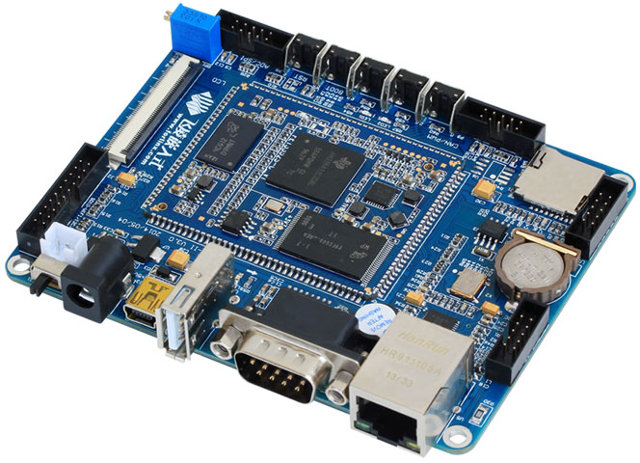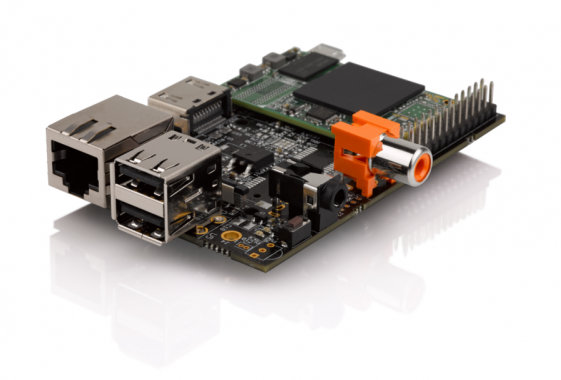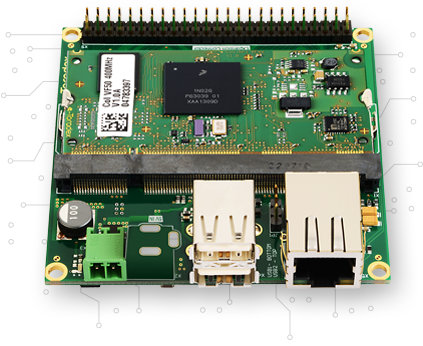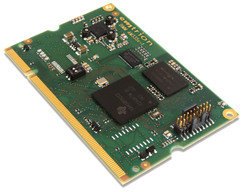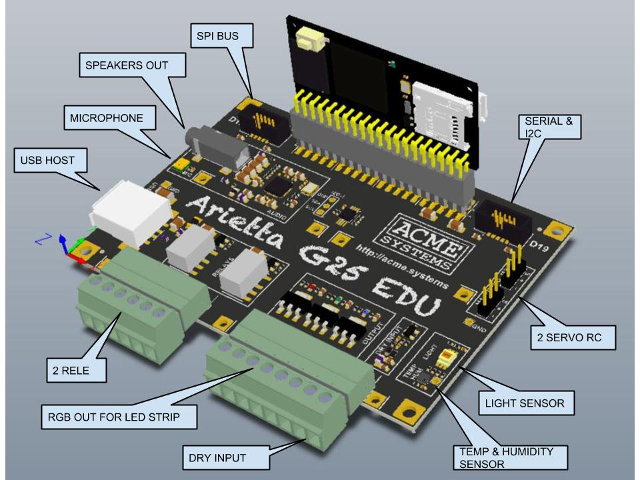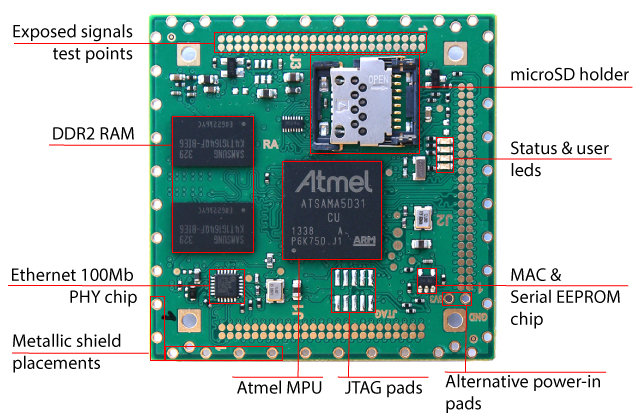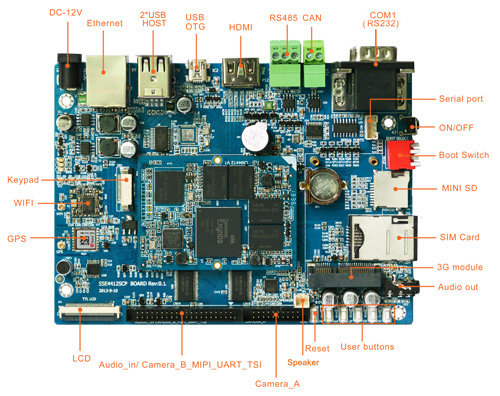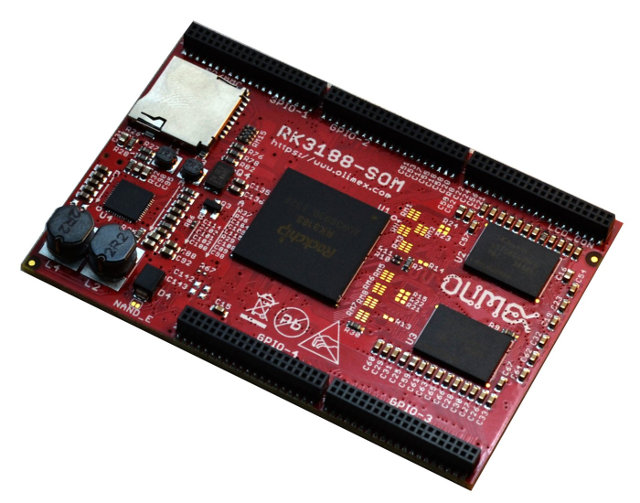Forlinx Embedded, a company based in Baoding, Hebei, China specializing in embedded systems design and manufacturing, has recently launched OK335xS-II single board computer powered by Texas Instruments AM335x SoC which they claim to be “the cheapest industrial Cortex-A8 board in history” as it sells for as low as 298 RMB or about $48. OK335xS-II board is comprised of a baseboard and a CPU module soldered to the carrier board with the following specifications: SoC – Texas Instruments AM335X ARM Cortex-A8 processor @ 800MHz with PowerVR SGX530 GPU System Memory – 128M DDR3 + micro SD slot Storage – 256MB SLC NAND Flash Display I/F – LCD interface with support for LCD to LVDS and LCD to VGA, and resistive touchscreen interface Connectivity – 1x 100M Ethernet USB – 1x USB 2.0 host, 1x mini USB 2.0 device Serial – 5x serial port (1x debug interface, 4x TTL port) Expansions headers […]
SolidRun HummingBoard Raspberry Pi-Like Board is Now Available for $45 and Up
HummingBoard is a board made by SolidRun that’s mechanically compatible with the Raspberry Pi, and offering the same expansions connectors, and a few extras. The board is comprised of a baseboard and a microSoM powered by Freescale i.MX6 Solo, Dual Lite or Dual. At first it looked like an internal project, but the board went viral together with the Banana Pi, and the company has now announced availability for the HummingBoard with pricing starting at $45 for the single core version up to $100 for the dual core version with extra options. There are currently three models: HummingBoard-i1 ($44.90) – Freescale i.MX6 Solo with GC880 GPU, 512 MB RAM, 10/100M Ethernet HummingBoard-i2 ($74.99) – Freescale i.MX6 Dual Lite with GC880 GPU, 1GB RAM, 10/100M Ethernet HummingBoard-i2ex ($99.99) – Freescale i.MX6 Dual with GC2000 GPU, 1GB RAM, Gigabit Ethernet, LVDS output, mSATA II interface, PCI Express Gen 2 slot, RTC with […]
Toradex Customized Single Board Computers Powered by Freescale Vybrid and i.MX6 Sell for 39 Euros and Up
Toradex has launched what they call “Customized SBCs” (Single Board Computers) comprised of the usual carrier board an computer-on-module (CoM) combination, using their Apalis & Colibri families. The company offers various combination of Freescale i.MX6 and Vybrid VF50 single board computers, with price starting at 39 Euros for 1k order, or 49 Euros for samples. I’ve already featured Toradex Colibri VF50 (and VF61) modules in another post, but to summarize Colibri VF50 is a computer modules based on Freescale Vybrid VF50 ARM Cortex A5 CPU with 64 to 128MB DDR3, and 128MB NAND flash that targets industrial applications requiring long term availability (15 years). VF50 sells as low as 19 Euros per unit for 10k orders. Viola is a new open source hardware carrier board with the following features: Compatible with all Toradex Colibri CoMs External Storage – microSD interface Video – RGB LCD Interface, 4 wire resistive touch interface […]
Emtrion DIMM-AM335x SoM Supports Mainline Linux Kernel
When I cover system-on-modules (SoM), companies will usually provide some BSP (Board Support Packages) for older kernels, and did not submit their changes to mailine kernel, so I was interested in a news from Emtrion entitled “DIMM-AM335x: Linux mainline support ready“, which actually means they’ve done the work to support a recent Linux kernel (3.14) and provides instructions and code (device tree files), but did not submit patches to the linux-arm-kernel mailing list to get their changes added to kernel.org. Let’s look at the hardware specs first: SoC – Texas Instruments Sitara AM335x ARM Cortex A8 processor @ 720Mhz to 1GHz (AM3354 or AM3359) System Memory – onboard 512 MB SDRAM/optional 256 MB Storage – 512 MB NAND Flash (managed) + 2 SD card interfaces Display – LCDs I/F with resolution up to SVGA, with 4-wire touch interface Audio – Analog Audio with SSI I/F USB – USB 2.0 Host […]
Acme Systems Arietta EDU Open Hardware Baseboard for Arietta G25 SoM (ARM9)
Arietta G25 is a tiny system-on-module (SoM) powered by Atmel SAM9G25 ARM9 processor and running Linux that sold for a discount earlier this year (9.9 Euros) for early backers, and is now available for 20 Euros, and support an optional Wi-Fi module for as low as 7 Euros extra. Acme Systems, the company who made the board, is now considering designing and manufacturing an open source hardware baseboard for the module, and is asking for feedback from the community before going ahead. Currently the idea is to have a baseboard with the following: Arietta G25 SoM connector (Vertical mount) 1x USB Host port I2C Sensors – Temperature and Humidity sensor, Light sensor Mosfet output for RGB led strip 2x relay output 1x filtered dry input 2x servo RC motors output Audio interface with embedded microphone and jack for PC speakers using Wolfson WM8731 codec Expansion headers for external modules already […]
Acme Systems Acqua A5 is a System-on-Module Powered by Atmel SAMA5D3 Processor
Acme Systems has announced availability of their Acqua A5 SoM with Atmel SAMA5D31 Cortex A5 micro-processor, up to 512 MB RAM, up to 256 MB Flash, a serial EEPROM, a micro SD card slot, and an Ethernet PHY. The module targets headless or LCD based system such as automation or control panels, and is available in commercial and extended temperature range. Specifications: Processor – Atmel SAMA5D31 ARM Cortex-A5 MPU @ 536MHz System Memory – 256MByte DDR2 RAM @ 32 bit (optionally 512MB) Storage Embedded micro SD hinge type holder for OS and data Optional 256 MB NAND flash Atmel AT24MAC402 – 2Kbit serial EEPROM Connectivity – 10/100 Mbit Ethernet I/F (can be turned off for power saving) Three USB Host ports (one configurable as USB device) Connectors – 3x 50-pin connectors pitch 1.27 mm (50 mils) Signal accessible via connectors: (Check pinout for details) 10/100 Mbit Ethernet phy RGB I/F […]
Boardcon EM4412 SBC Powered by Exynos 4412 SoC Targets Embedded & Industrial Applications
Boardcon Technology Limited, a Shenzhen based ODM specializing in industrial boards and modules, has announced their EM4412 single board computer featuring MINI4412 core board powered by Samsung Exynos 4412 quad core Cortex A9 SoC a few months ago. The board, with ports such as CAN, RS-485, and a DB9 RS-232 connector, appears to have been designed with industrial applications in mind, such as point-of-sales (PoS), slot machines, car-mounted systems, factory automation, traffic management, and more. Boardcon EM4412 specifications: SoC – Samsung Exynos 4412 quad core Cortex A9 cores @ up to 1.6GHz and ARM Mali-400MP4 GPU System Memory – 2GB DDR3 RAM Storage – 4GB eMMC flash + mini? / micro SD card slot Display HDMI 1.4 – Up to 1080p30 24-bit RGB parallel LCD interface Optional 4.3″, 7″, or 10.1″ch resistive or capacitive touchscreen Camera interfaces: MIPI-CSI slave (mipi2L CH) Optional 2x camera interfaces supporting ITU 601/656 I/F up […]
Olimex Showcases RK3188-SOM Module and RK3188-EVB Evaluation Board
After launching AllWinner and Texas Instruments SoMs earlier this month, Olimex appears to be on a roll, and the company showed some working prototypes of their upcoming Rockchip RK3188 quad core ARM Cortex A9 system-on-module, and corresponding evaluation board called RK3188-SOM-EVB including both a baseboard and a SoM. Preliminary specifications for RK3188-SOM: SoC – Rockchip RK3188 quad core ARM Cortex A9 @ 1.6Ghz with Mali-400 MP4 CPU System memory – 1GB DDR3 Storage – micro SD card slot, and optional 4GB NAND flash Power Management IC Debugging – debug UART console Misc – 2x buttons, 3x status LEDs Connectors – 5 GPIO connectors 2×20 pins 0.05″ step There will be two models: RK3188-SOM and RK3188-SOM-4GB, the latter adding 4GB NAND Flash. Both will be available in June for respectively 40 and 45 Euros per piece for 1k orders. For development and evaluation purpose, the company will also provide an open source hardware base board, RK3188-SOM-EVB, […]


